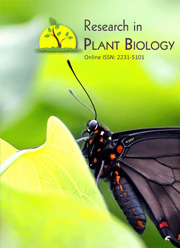Plant bioassay screening exposes Bacillus cereus strain UPMLH24 as the most potential plant growth-promoting rhizobacteria strain
Abstract
The benefits that plants obtain through their association with plant growth-promoting rhizobacteria may be derived via various mechanisms such as nitrogen fixation, phosphate solubilisation, phytohormone production and the inhibition of antagonistic activity of harmful biological agents in the soil. Seeds of two vegetable crop plants, namely mustard (Brassica juncea) and Mung bean (Vigna radiata) were inoculated with 14 rhizobacteria isolated from the pepper (Piper nigrum) rhizosphere to evaluate their effect on seed germination and subsequent vigour of the germinated seedlings.  All the isolates improved seed germination and seedling vigour of both crop species.  Among the 14 inocula, isolate UPMLH24 showed the best performance in enhancing the vigour of mustard and bean seedlings. This isolate was identified as Bacillus cereus by phylogenetic analysis of the 16S rRNA gene hypervariant region sequencesDownloads
Download data is not yet available.
Published
26-03-2015
How to Cite
Aziz, Z., Halimi, M., Abdul-Rahim, K., & Malahubban, M. (2015). Plant bioassay screening exposes Bacillus cereus strain UPMLH24 as the most potential plant growth-promoting rhizobacteria strain. Research in Plant Biology, 5(2). Retrieved from https://updatepublishing.com/journal/index.php/ripb/article/view/2635
Issue
Section
Articles



 .
. 